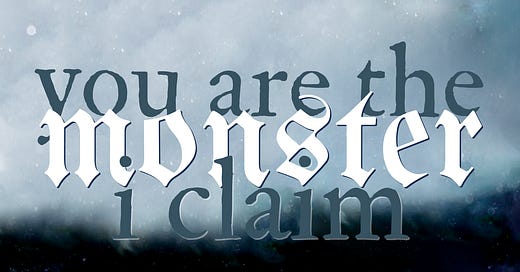I have a confession to make.
I am incredibly bad at romance.
In writing it, in reading it, and in real life.
It’s strange to be known for having written a work of romantic fantasy, or…romantasy? as it’s called these days, because I don’t really think of the Wintersong duology as being particularly romantic. Romantic with a Capital R? Yes. Gothic, most certainly. But the point of those books was never about the love story between Liesl and the Goblin King; they were about Liesl’s coming-of-age—as an artist, as a woman, but most importantly, as who she is, entire.
I am, I think, someone who is profoundly uninterested in romance.
This isn’t to say that I’m uninterested in love. I love books about love—all kinds of love—romantic, sexual, platonic, familial, and more. But romance is where I struggle, mostly because I think I’m chronically unsentimental. While I do enjoy a romantic subplot, I tend to hiss and become resentful the minute I sense all decisions are made not for the sake of stakes, but for romance. Facts don’t care about your feelings! I want to cry. Sentiment has no place here!
It’s probably why I find rereading Wintersong the most cringe of all my books.
Oh, the cringe.
There are so many things about Wintersong that would turn me off as a reader—that do turn me off as a reader—if I hadn’t been the person who wrote it. The Goblin King, for one. If I get a whiff of broodiness in a male lead, I run screaming for the hills. I find it neither interesting nor attractive, and I tried my very best while writing to puncture that broodiness whenever an opportunity presented itself.
The Goblin King shot me a glare before realizing just who it was in his chambers, alone and undressed.
“Elisabeth!” Unbelievably, his voice cracked, like a schoolboy’s.
I am, at heart, a fairly unserious person. I delight in discomfort, and am just cruel enough to revel in the humiliation of my characters. And perhaps I like my romantic storylines this way, as well. I’m fond of Jane Austen, but not so much of the 2005 adaptation of Pride & Prejudice, which seemed to take away all the playfulness and unsentimentality of the original work. Take, for instance, Darcy’s initial confession of affection, where the discomfort and humiliation of Elizabeth are detailed at length:
But this idea was soon banished, and her spirits were very differently affected, when, to her utter amazement, she saw Mr. Darcy walk into the room. In a hurried manner he immediately began an inquiry after her health, imputing his visit to a wish of hearing that she were better. She answered him with cold civility. He sat down for a few moments, and then getting up walked about the room. Elizabeth was surprised, but said not a word. After a silence of several minutes, he came towards her in an agitated manner, and thus began:—
“In vain have I struggled. It will not do. My feelings will not be repressed. You must allow me to tell you how ardently I admire and love you.”
Elizabeth’s astonishment was beyond expression. She stared, coloured, doubted, and was silent. This he considered sufficient encouragement, and the avowal of all that he felt and had long felt for her immediately followed. He spoke well; but there were feelings besides those of the heart to be detailed, and he was not more eloquent on the subject of tenderness than of pride. His sense of her inferiority, of its being a degradation, of the family obstacles which judgment had always opposed to inclination, were dwelt on with a warmth which seemed due to the consequence he was wounding, but was very unlikely to recommend his suit.
Compare this to the actual confession of true love toward the end of the novel:
The happiness which this reply produced was such as he had probably never felt before; and he expressed himself on the occasion as sensibly and as warmly as a man violently in love can be supposed to do.
And just how, pray tell, does a man violently in love express himself, Miss Austen? Show, don’t tell! The rest of this chapter wherein our two leads declare their feelings for one another mostly centers on them expounding upon their many flaws and faults, without an ounce of the sentimentality that usually turns me off romances.
You taught me a lesson, hard indeed at first, but most advantageous. By you, I was properly humbled.
INJECT IT INTO MY VEINS.
Wintersong is perhaps the most earnest of my novels, and for that reason, I do find it the most cringe. Liesl takes herself so seriously, and if I am intimately acquainted with her yearning and longing for acceptance and validation, I rarely—if ever—display them in such a raw and vulnerable way. Like Elizabeth Bennet, I am more inclined to tease and laugh—even at my own expense.
“Oh, shocking!” cried Miss Bingley. “I never heard anything so abominable. How shall we punish him for such a speech?”
“Nothing so easy, if you have but the inclination,” said Elizabeth. “We can all plague and punish one another. Tease him—laugh at him. Intimate as you are, you must know how it is to be done.”
It’s my Gemini Venus, I know, I know.
Or perhaps I’m just a monster.
Every once in a while, I think about Wintersong having been published too early for the romantasy trend. It’s certainly got all the hallmarks, with romance and fantasy having equal weight (and also its share of 🌶️), but then I think again of how uncomfortable the romance space actually makes me. Not romantic storylines, but the romance space of publishing itself.
Because all the thrills of romance as a genre generally leave me feeling cold.
There is a sexual aspect of romance that I, as an ace person, struggle with when it comes to books. I don’t mind sexual scenes; in fact, I read and enjoy quite a lot of erotica. It’s not the sex scenes themselves that are so off-putting to me; it’s sexual attraction itself. I’m not overly familiar with sexual attraction, and to have something like attraction influence my decisions in a narrative is foreign to me. So what if someone is hot? What does that have to do with anything? While romance spaces generally try to be inclusive and welcoming, it’s this barrier of the matter of sexual attraction that I struggle most to overcome.
It’s also why I feel it’s disingenuous to include Wintersong in the romantasy category, especially as Shadowsong doesn’t fulfill those expectations at all.
I know a lot of readers were disappointed that Shadowsong featured less of the Goblin King, but I, on the other hand, found it a relief. For me, the book was equally Liesl and Josef’s story, and the point of that book was not romance, but love. Just…love. For me, the romantic storyline was (mostly) finished; it served as a vehicle for Liesl to better love and understand herself, so she could better go out and love the world as she needed to. I almost always know which readers of Wintersong won’t like Shadowsong…and they are the ones who read the first because of the romance, and not because of the coming-of-age story.
Because the Wintersong duology is a coming-of-age story, of the loss of innocence and the gain of experience. Romance certainly plays a large role in that for a lot of young people, but it’s not the be all, end all of the narrative. So this is why I always feel a little leery when talking about the books as romantasy. I know I don’t go where a lot of people want me to. I can’t help but see an expectation, and then swerve to avoid it.
But then again, maybe that’s the troll in me.






I feel this post sooo much. Probably not surprising I am on the aro and ace spectrums